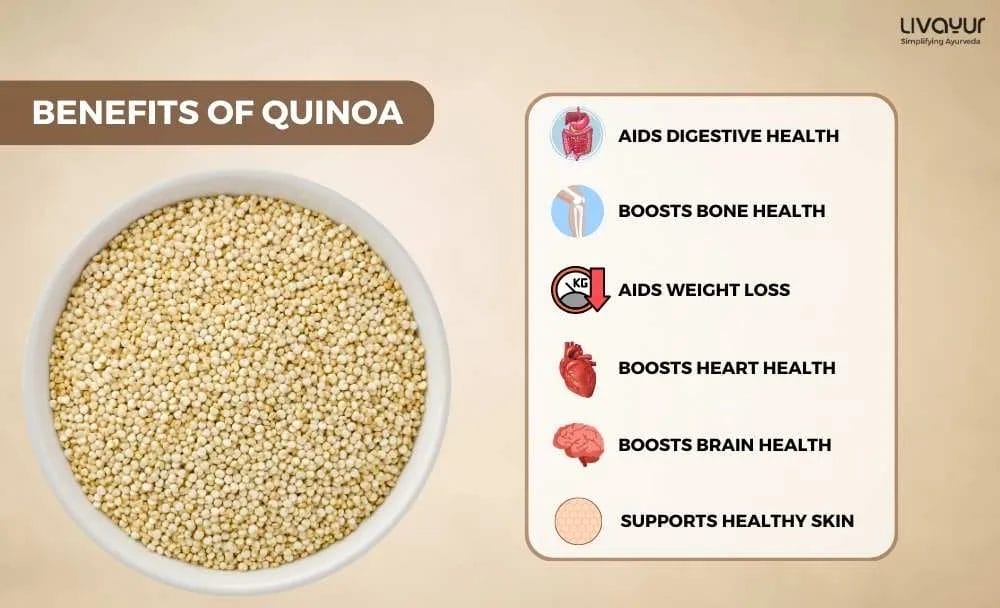
Quinoa is a grain-like seed that has been grown in the Andean region of South America for thousands of years. It has gained immense popularity in recent years due to its high nutrient content and numerous health benefits.
Nutritional facts for quinoa
Here’s the nutritional value of 100g of cooked quinoa. [8]
| Name | Amount |
| Water | 71.6g |
| Energy | 120 kcal |
| Protein | 4.4g |
| Total lipid (fat) | 1.92g |
| Carbohydrate, by difference | 21.3g |
| Fiber, total dietary | 2.8g |
| Calcium, Ca | 17mg |
| Iron, Fe | 1.49mg |
Quinoa Benefits
Quinoa has several health benefits due to its nutrient content. Here are some of the primary and secondary quinoa seeds benefits:
1. Improves Digestive Health
Primary Benefit: Quinoa is high in dietary fiber, which helps to promote digestive health by reducing constipation and improving bowel regularity.
Secondary Benefit: Quinoa contains saponins, which are plant compounds that have been shown to have anti-inflammatory and anti-cancer properties. Saponins also have prebiotic effects, which means they promote the growth of beneficial bacteria in the gut [1].
2. Helps with Weight Loss
Primary Benefit: Quinoa is low in calories and high in protein and dietary fiber, making it a filling food that can help with weight loss.
Secondary Benefit: Quinoa has a low glycemic index, which means it causes a slow and steady rise in blood sugar levels. This helps to reduce cravings and prevent overeating [2].
3. Reduces the Risk of Chronic Diseases
Primary Benefit: Quinoa is rich in antioxidants, which help to protect the body from damage caused by free radicals. Free radicals can contribute to the development of chronic diseases such as cancer, heart disease, and diabetes.
Secondary Benefit: Quinoa contains several minerals such as magnesium and potassium, which have been shown to have a protective effect against chronic diseases [2].
4. Promotes Healthy Blood Sugar Levels
Primary Benefit: Quinoa is a good source of complex carbohydrates, which are digested slowly and help to prevent spikes in blood sugar levels.
Secondary Benefit: Quinoa contains a compound called quercetin, which has been shown to have anti-diabetic properties by reducing blood sugar levels and improving insulin sensitivity [3].
5. Improves Heart Health
Primary Benefit: Quinoa is rich in heart-healthy monounsaturated and polyunsaturated fats, which can help to reduce LDL (bad) cholesterol levels and improve overall heart health.
Secondary Benefit: Quinoa is also a good source of magnesium, which has been shown to reduce the risk of heart disease [4].
6. Supports Bone Health
Primary Benefit: Quinoa is a good source of several minerals that are important for bone health, including magnesium, phosphorus, and manganese.
Secondary Benefit: Quinoa also contains a compound called saponarin, which has been shown to help increase bone density and reduce the risk of osteoporosis [5].
7. Boosts Brain Function
Primary Benefit: Quinoa is a good source of several B vitamins, including thiamine, riboflavin, and niacin, which are important for brain function and cognitive performance.
Secondary Benefit: Quinoa also contains a compound called quercetin, which has been shown to improve cognitive function and protect against age-related cognitive decline [6].
8. Supports Healthy Skin
Primary Benefit: Quinoa is rich in several nutrients that are important for skin health, including vitamin E, zinc, and copper.
Secondary Benefit: Quinoa also contains a compound called kaempferol, which has been shown to have anti-inflammatory and antioxidant properties that can help protect the skin from damage and promote healthy aging [7].
9. Rich in dietary fiber
Primary Benefit: Quinoa’s health benefits include its dietary fiber, which promotes digestive health and regular bowel movements.
Secondary Benefit: The fiber content in quinoa helps prevent constipation and supports a healthy gut microbiome. [8]
10. Calcium-rich superfood
Primary Benefit: Quinoa is a notable plant-based calcium source, a vital mineral for bones and teeth.
Secondary Benefit: Including quinoa in your diet can benefit individuals following a vegetarian or vegan lifestyle. [8]
How to consume quinoa and recipes related to quinoa
Here are different ways to consume quinoa through some flavorful recipes.
1. Boiled
- Rinse quinoa under cold water.
- Combine quinoa and water in a pot (use a 2:1 water ratio to quinoa).
- Bring to a boil and simmer until water is absorbed.
- Serve as a side dish or base for other recipes.
2. Salad
- Cook it according to instructions and let it cool.
- Mix with fresh vegetables (like tomatoes, cucumbers, and bell peppers).
- Add herbs, olive oil, and a squeeze of lemon for a refreshing quinoa salad.
3. Breakfast Bowl
- Cook and mix it with your ideal breakfast ingredients.
- For a nutritious morning bowl, top with fruits, nuts, yogurt, and a drizzle of honey.
4. Stir-Fry
- Cook quinoa and set aside.
- Sauté vegetables, protein (tofu, chicken, or shrimp), and cooked quinoa in a pan.
- Season with your preferred stir-fry sauce.
5. Soup
- Add cooked quinoa to your favorite soup for added texture and nutrition.
- Quinoa pairs well with vegetable, chicken, or lentil soups.
6. Porridge
- Cook quinoa with milk (or a non-dairy alternative) and your choice of sweetener.
- For a warm and comforting breakfast, top with fruits, nuts, or seeds.
Conclusion
Quinoa is a nutrient-dense food that can provide several health benefits. Its high protein and fiber content make it a filling food that can aid in weight loss. Quinoa’s antioxidant content can help to reduce the risk of chronic diseases such as cancer, heart disease, and diabetes.
Additionally, quinoa is gluten-free and can be consumed by people with celiac disease or gluten intolerance.
The primary benefits of quinoa include its high protein and fiber content, which can aid in weight loss and reduce the risk of chronic diseases. Quinoa is also a good source of minerals such as magnesium, potassium, and iron, which are essential for various bodily functions.
The secondary benefits of quinoa include its potential to lower cholesterol levels, reduce inflammation, and improve blood sugar control. Quinoa is also a good source of antioxidants, which can help to prevent oxidative stress and the associated health problems.
Incorporating quinoa into your diet is easy and can be done in several ways. It can be used as a substitute for rice or pasta, added to salads or soups, or even used in baked goods. By including quinoa in your diet, you can reap its numerous health benefits and enjoy its delicious taste.
FAQs
1. What are the benefits of quinoa for the skin?
Quinoa contains antioxidants and minerals contribute to skin health. It helps maintain hydration, promote collagen production, and guard the skin against oxidative stress for a radiant and youthful complexion.
2. What are quinoa nutrition facts and benefits?
Quinoa is a nutrient-dense whole grain, high in protein, fiber, vitamins, and minerals. Its benefits include supporting heart health, aiding digestion, providing essential amino acids, and being suitable for those with gluten sensitivity.
3. What are quinoa’s benefits and side effects?
Quinoa is a healthy grain that promotes weight loss, supports muscle growth, and provides essential nutrients. While it is generally safe, excessive consumption may lead to digestive issues for some individuals.
Disclaimer: The information provided here is for general information and is not meant to substitute any medical advice. Please consult your doctor for appropriate medical consultation.
References:
- https://www.ncbi.nlm.nih.gov/pmc/articles/PMC8498072/
- https://www.healthline.com/nutrition/quinoa#benefits
- https://www.news-medical.net/news/20220922/Quinoa-based-diet-stabilizes-blood-sugar-in-older-adults.aspx#:~:text=In%20addition%20to%20its%20high,will%20raise%20blood%20sugar%20levels.
- https://medlineplus.gov/ency/patientinstructions/000731.htm#:~:text=Quinoa%20contains%20heart%2Dhealthy%20fats,punch%20in%20a%20small%20amount.&text=Quinoa%20can%20be%20cooked%20and,it%20in%20water%20like%20rice.
- https://www.ncbi.nlm.nih.gov/pmc/articles/PMC4957693/
- https://www.sciencedirect.com/science/article/pii/S1756464622001670
- https://www.sciencedirect.com/science/article/pii/S2590157523001293
- https://fdc.nal.usda.gov/fdc-app.html#/food-details/168917/nutrients


















